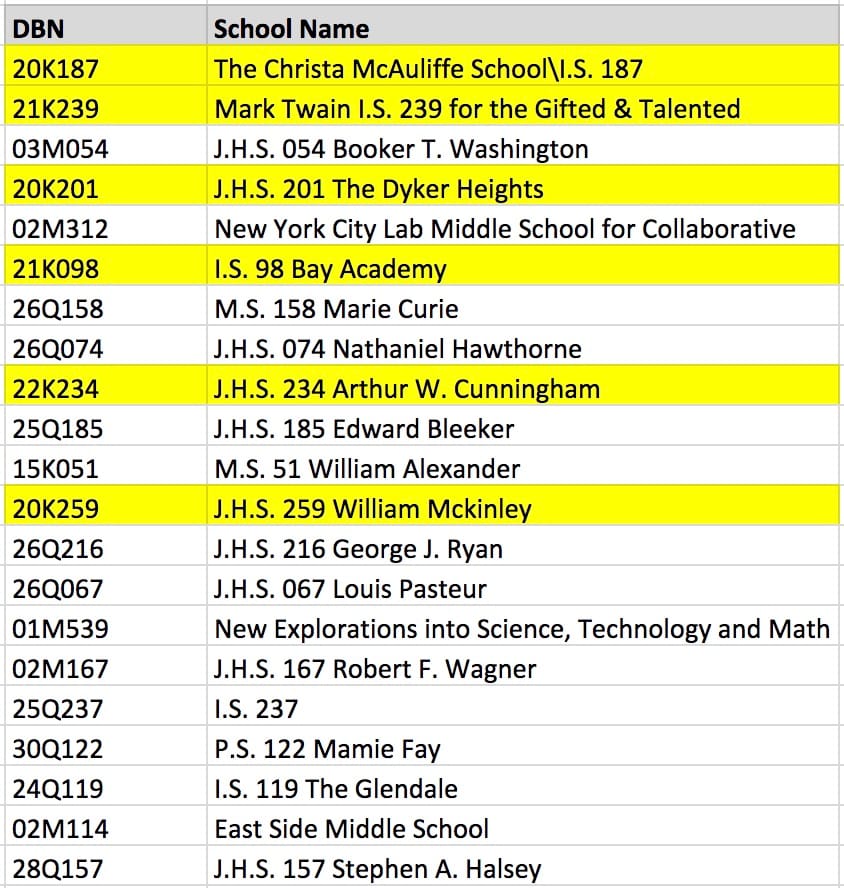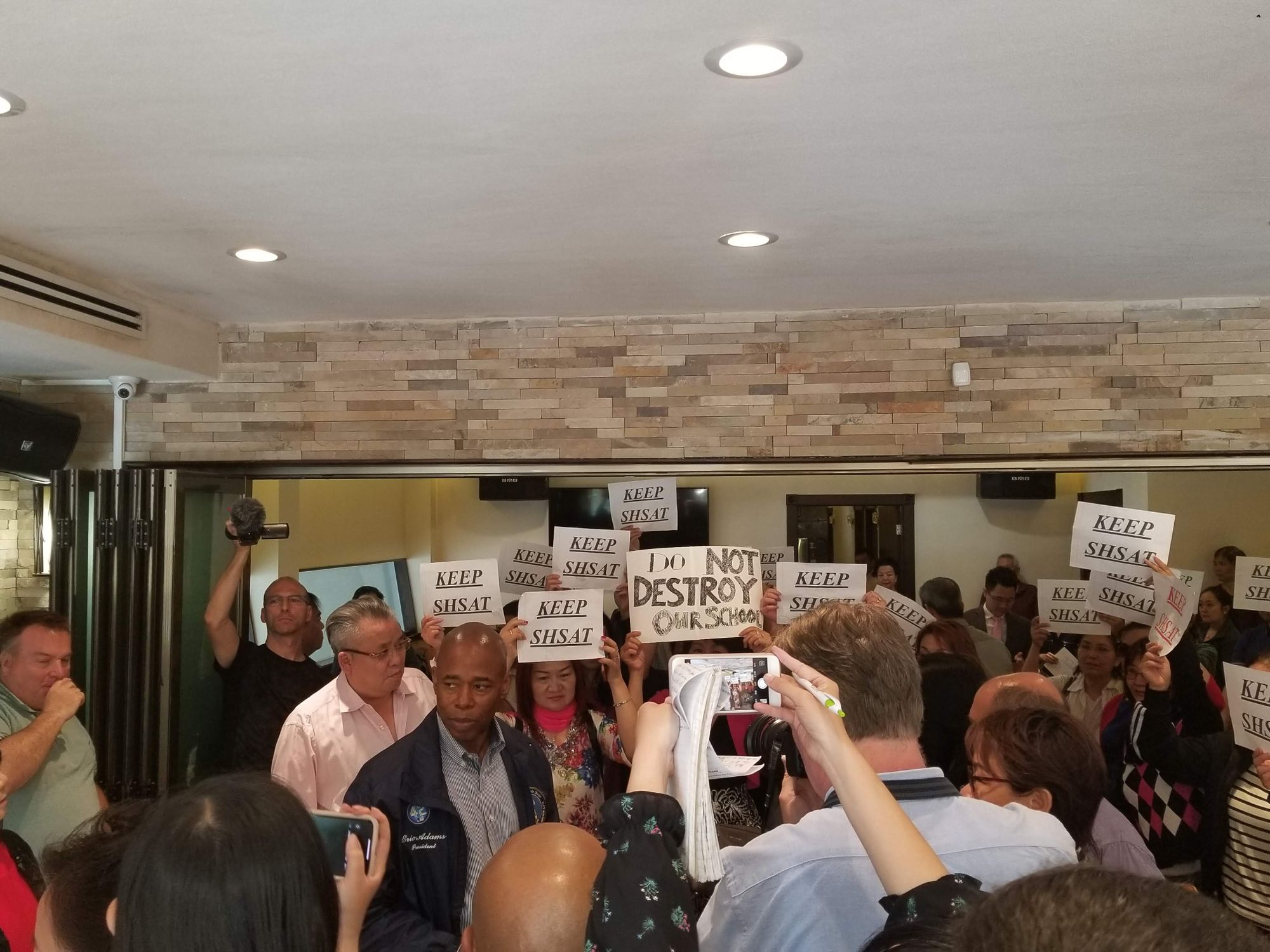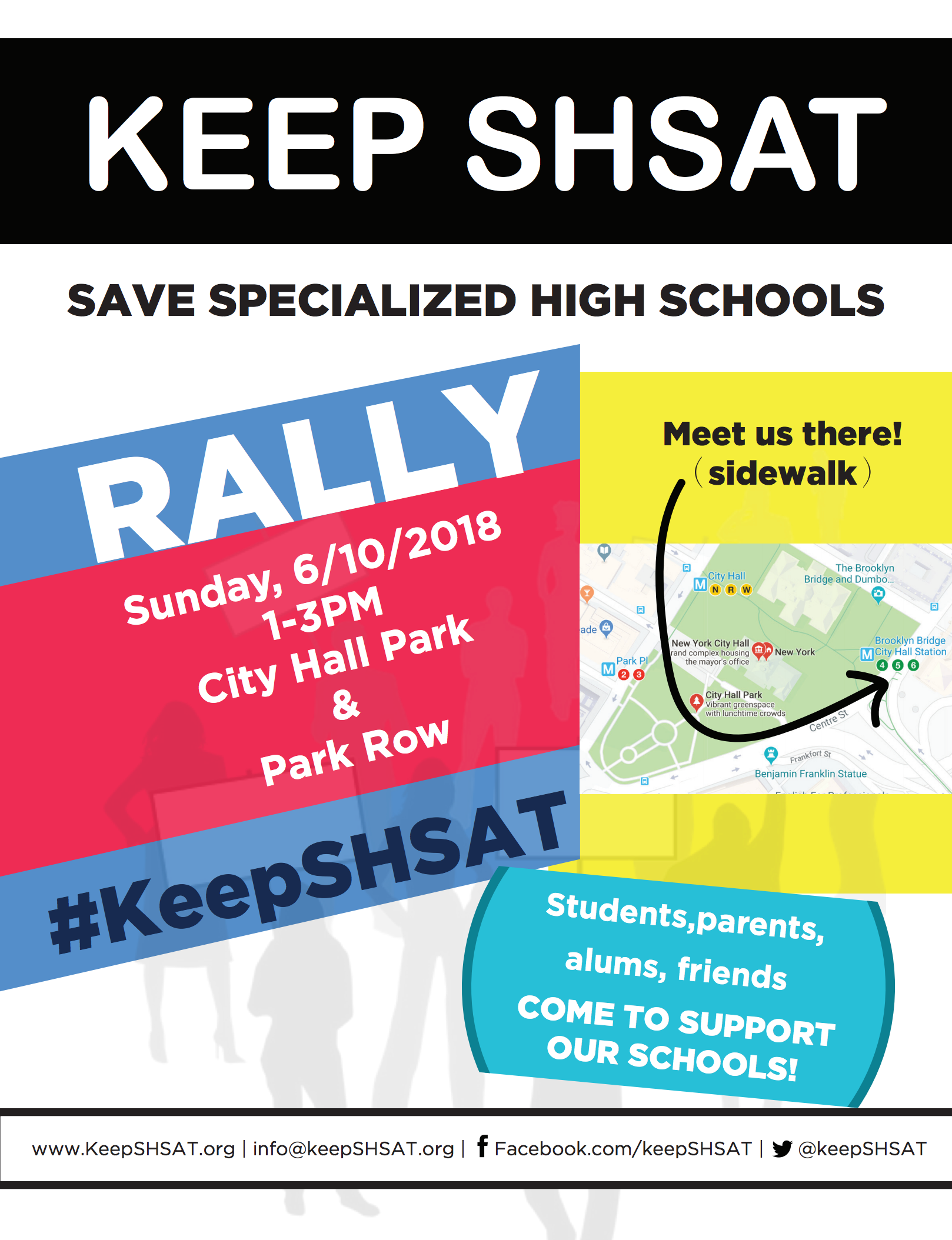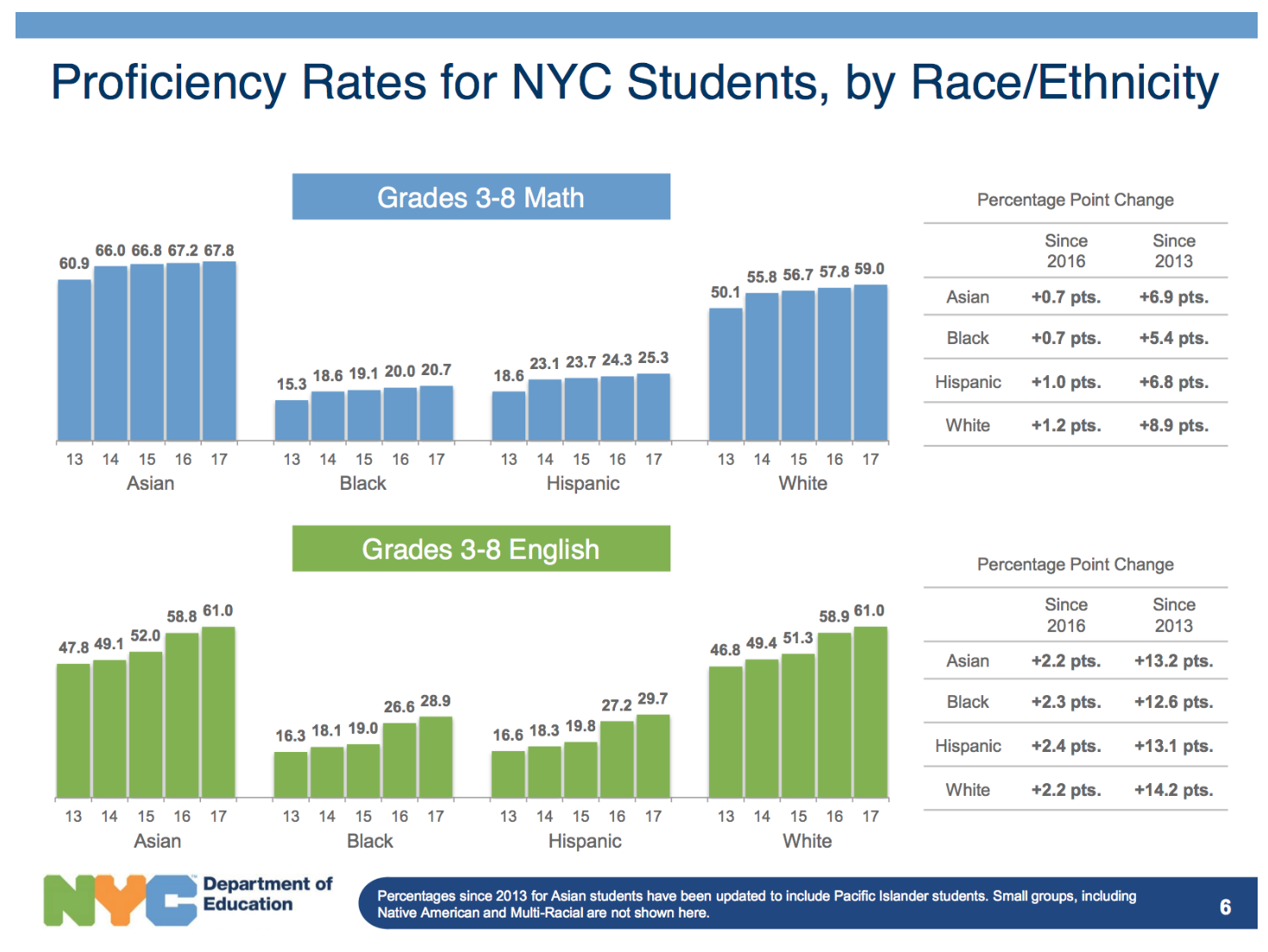Why so many Southern Brooklyn parents worry about Mayor’s plan to reform Specialized High School admissions


Southern Brooklyn – Mayor de Blasio plans to radically change the racial composition at Specialized High Schools (SHS) by setting aside 20% of the ninth-grade seats for low-income students who missed the test score cutoff, starting in the fall of 2019. Currently, about 5,000 students get selected each year by the test, called SHSAT, to attend 8 Specialized High Schools. Ultimately the plan envisions phasing out the SHSAT completely and instead offering slots to the top 7% of middle school students.
New York State Assembly put off action on de Blasio’s desegregation plan for elite NYC high schools till next session, and there has been quite a bit of coverage of this in the city (see links at the bottom of the story), but it is unlikely to get much support from Southern Brooklyn Senators or Assemblymembers.
A big reason why, is that the proposed changes would disproportionately affect students from three Southern Brooklyn School Districts – D20 (Bay Ridge, Bensonhurst), D21 (Gravesend and Coney Island), and D22 (Flatbush, Midwood, Sheepshead, Marine Park).
Students from these districts account for about a quarter of all students that enter the specialized high schools from a public school in NYC, and they also account for more than 72% of all Brooklyn public school kids that are admitted to the SHS, based on the Department of Education data from 2015 admissions.
When the Mayor was saying it was wrong that half of the admissions to Specialized High Schools in 2016 came from just 21 schools (4 percent of all New York City middle schools), these are the schools he was referring to:

Note that 5 of the top 10 are in Districts 20, 21 and 22. The Christa McCaulife School (I.S. 187) has a graduating class of 276 children, with average proficiency score across the school at 3.95. According to the latest school quality snapshot from DOE, this is where kids from this school typically go:
- 36% Stuyvesant High School
- 20% Brooklyn Technical High School
- 20% Staten Island Technical High School
- 4% Midwood High School
- 3% Fiorello H. Laguardia High School Of Music & Art And Performing Arts
Based on that data, almost 76% of students move on to the three big Select High Schools – that’s about 220 students this year (an estimate).
- 16% Brooklyn Technical High School
- 15% Stuyvesant High School
- 11% Fiorello H. Laguardia High School Of Music & Art And Performing Arts
- 6% Fort Hamilton High School
- 5% Leon M. Goldstein High School For The Sciences
Similarly, that is about 31% to the 2 of the big ones (excluding Laguardia which auditions) – about 150 students.
Similarly, of the 512 graduating students at The Dyker Heights JHS, at least 21% (108 kids) are expected to go to a Specialized High School, based on historic performance.
But even at smaller schools, like the Brooklyn School of Inquiry (PS/IS 686), one of the citywide gifted & talented schools like NEST+M and Anderson in Manhattan, 46 students of its graduating class of 86 (54%) were offered seats at SHS this year.
Every day this week, local parents have been gathering at Asian restaurants across Southern Brooklyn, Queens, and Staten Island to discuss what the changes mean for their children, and to organize. There was a big rally on Tuesday at City Hall, rallies in Flushing and on Staten Island, and there will be another big rally this coming Sunday between 1-3pm at the City Hall Park in Manhattan, opposing the proposed changes:

Their worry? Politics played at their kids’ expense and a flawed reform that cuts off the opportunity, especially for those that are new to this country to lift themselves out of poverty through prioritizing education for their children. Lack of consultation and discussion about the plan is high up on the list of concerns. To this effect, Community Education Council for District 20 will have another meeting on this topic next Wednesday, June 13th at 7pmat P.S. 176th, located at 1225 Bay Ridge Avenue at 12th Avenue.
The issue, addressed at every turn, is that the current proposal would not meaningfully integrate the top schools without lowering educational standards, because so few Black and Hispanic children graduate at levels 3 and 4 – approaching or meeting grade-level standards. The problem, parents say, is not the top schools, it’s the fact that so few of our middle schools graduate children ready to be admitted to them:

Because no increase in seats is proposed at the Specialized High Schools, kids who score high enough to be admitted would not be admitted, while other students who scored less well would – deeply unfair for their children, their mostly immigrant and poor parents say.
“It feels like we are being penalized for doing well” was brought up by a number of parents at a meeting in Bensonhurst on Tuesday, feeling anti-Asian sentiment in the rhetoric. So much so, that the Chinese American Citizen’s Alliance is requesting both Mayor de Blasio and Schools Chancellor Carranza apologize for their statements:
Thank you @CACAnational for taking action, now we do too, it’s in our name; no model minority myth, no perennial foreigner stereotype, #NotYourWedge @KeepSHSAT pic.twitter.com/8l4TlIAEl7
— Asian American Action Fund (@AAAFund) June 7, 2018
Local politicians are echoing parents’ concerns in their statements, which we are reprinting in full, so you know exactly where your elected representative stands on the issue in light of upcoming elections:
Assemblyman William Colton (D-Gravesend, Bath Beach, Bensonhurst) was first to speak out against the proposal, and urged parents to organize:
“We must not let this proposal distract us from the failings of the current Department of Education in providing for the needs of high achieving students throughout the system”, he says.
“High caliber education, developing the best and brightest students possible, is under attack. They are lowering the standards instead of investing in schools and districts by providing gifted and talented programs to serve all children, in all neighborhoods.
“For too many years the city has ignored high performing students throughout the city, especially lower-income communities and those with a majority of black & Hispanic students. Parents have no confidence that the NYC school system can meet the needs of their gifted children. It’s no surprise when they are offered scholarships to private schools looking to boost their diversity, these high performing students are lost from the NYC school system.
“Parents and all who are concerned with educating our children must band together to demand higher standards.”
Senator Martin J. Golden (R, C, I):
“Currently, the specialized high schools are open to all based on test scores. Any changes to the current admissions system should be vetted. All stakeholders should be heard, and a consensus reached, before radical changes are made to a system, which has been successful. If these changes require State action to implement, it is my current intention to oppose them. By arbitrarily setting a percentage of students who failed to make the test cutoff, the Mayor will be denying students who earned a seat in these schools,” Senator Marty Golden said.
“This move by the Mayor is going to start a race for the bottom. At a time when there is a focus on science and math degrees, the Mayor is turning back the clock. Now is not the time to recklessly change our specialized high schools, which have been producing some of the best and brightest students. By opening up our specialized high schools to students who failed to make the cut, we are sending the wrong message. Every student who wants to go to a specialized high school deserves a chance, but by instituting random quotas we are sending students the wrong message – your parents’ income is more important than your intelligence,” continued Senator Golden.
“It is my hope that the Mayor will see the mistakes in his plan for our specialized high schools. The way to diversify our specialized high schools should be built on providing low income students increased access to academic help, so they can earn a slot in the school of their choice, not to deny students whose work earned them a spot. However, if he doesn’t realize what he is doing, there is no doubt that the Legislature should get involved to protect our specialized high schools,” concluded Senator Golden.
Ross Barkan (D), opponent to Senator Golden in upcoming elections:
“While I am personally a skeptic of standardized tests alone as a general measurement of student achievement, I understand the outrage of my Asian-American neighbors and stand with them in this fight. They are clearly being singled out by this misguided policy.
“The Asian-American students who attend specialized high schools largely come from low income, immigrant backgrounds, and they will only be punished if Mayor de Blasio has his way. Our public schools are deeply segregated and scrapping the SHSAT won’t change that reality, quite frankly. Why not focus on the vast majority of schools that are underfunded and segregated? New York State owes us millions of dollars and that’s the education fight we should be taking on right now.”
Andrew Gounardes (D), opponent to Senator Golden in upcoming elections:
“I agree that we need to have more diversity in our public schools. However, I don’t agree with Mayor de Blasio’s proposal to change the admissions process for specialized high schools in New York City, which serve only 5% of high school students and 1% of all students city-wide.
“This plan will disproportionately affect students in my district, many of whom are from first and second generation immigrant families, and is not a comprehensive solution to address the bigger issues facing our public schools. We should be focusing our attention on making every school in our city a beacon of academic achievement and one that any parent would be fiercely proud to send their child to.”
Assemblyman Robert Carroll (D):
“This week I have received hundreds of emails about A.10427-A, the proposal from the Mayor and Chancellor which would change the admissions process at New York City’s specialized high schools by phasing out and completely eliminating the Specialized High School Admissions Test. The timing of the introduction of this proposal and the manner in which it was introduced was ill-conceived and I do not support the legislation. Creating a rubric which allows for greater access and diversity in some of our top schools is admirable and necessary, but trying to reach that goal without a single hearing and 3 weeks before the legislature goes on recess is not the way to create sound legislation. I am glad that Speaker Heastie has assured the New York State Assembly that he will not bring A.10427-A to the floor of the Assembly for a vote.
“This issue demands debate, input from a broad cross-section of parents and educators, and careful consideration before a long established, though imperfect system is changed. Making sure all students have a pathway towards some of our best public schools is essential in any public school system. I believe any legislation we pass to change the SHSAT or augment the admission process must also include ways to improve our elementary and middle schools so more of our students are prepared for demanding academic environments. Furthermore, it is misguided to place so much emphasis on eight specialized high schools that only admit 5,000 freshmen per year. We must not let this small fraction of students dominate our discourse on how we bring high quality education to all students no matter the need or the neighborhood.
“Finally, it is regrettable that during this debate there has been no mention of students with learning differences or disabilities, who by some estimates make up 20% of our public school population and are consistently some of the most underserved. I look forward to discussing the issue in greater detail and taking the time to hear from educational experts, students, teachers, administrators, and parents about this topic and our public schools in general, so we can better serve all NYC Public School students.”
Blake Morris (D), opponent to Senator Simcha Felder in upcoming elections:
“We need to preserve the test and provide for more latitude to use grades and standardized test scores for some of the seats.
“I am completely opposed to how the mayor addressed this entire issue. The mayor used government by ambush in something that requires real work, sober thinking and enrollment from all stakeholders.
“Also critical to tell your readers the current law only provides for test admission to three of the 8 specialized high schools. Bronx Sci, Stuyvesant, Brooklyn Tech. The other 5 the city elected to make the test a requirement, a recent restriction. So if the mayor had the courage of his convictions he would have already changed the admission policy of the 5 schools completely under his jurisdiction and educational supervision.
“What we have here is political theater…and most people are not enjoying the show.”
Ethan Lustig-Elgrably (D), who is running for the Assembly seat vacated by Pamela Harris:
“We must do more to diversify our specialized high schools and create more opportunities for all students, regardless of background, to gain admission. However, I strongly oppose the Mayor’s proposal. This is not a process that should be rushed, and I look forward to getting the chance to work with all communities in my district to find solutions that strengthen and diversify our city’s schools, and create more opportunities for all of our kids at all grade levels.”
Council Member Chaim Deutsch:
“I am strongly opposed to this idea for several reasons. Firstly, it’s unfair to the students who have been working diligently for years to prepare for the admissions exam. Their parents often employ tutors, and the kids devote their free time to study. It’s not right for the City to now pull the rug out from under them and change the rules of admission.
“This potential change in policy will also impact high-performing students in middle schools, who may not be adequately prepared for the rigorous curriculum at these specialized high schools. These kids may end up underperforming and feeling left behind, leading to difficulties with college admissions and beyond.
“New York City youth would be better served by the City devoting additional resources to improve existing schools and give all students the opportunity to excel. Every child is special and deserves to be in a situation best suited for their abilities. 8.6 million New Yorkers – and over 1 million public school parents – should have their voices heard before this drastic change is made.
We should not be playing politics with our schoolchildren!”
Council Member Mark Treyger, Chair of the Council’s Education Committee:
“Anyone who has looked at school enrollment data knows that segregation is a serious, systemic problem throughout our schools, and this is unacceptable. We need to focus on integrating schools at every grade level.
“Solutions to this problem cannot be piecemeal, and they cannot be developed without thoughtful dialogue with communities, stakeholders, and experts. We need to look to recommendations from the School Diversity Advisory Group, an inclusive panel of experts from a variety of fields and communities, who have been soliciting public input at Town Halls. We need considered, meaningful, holistic solutions that address the full spectrum of diversity of our students.
“We shouldn’t only focus on integration in the ninth grade. This plan impacts schools which serve only five percent of high school students, and less than two percent of all students. We need a comprehensive equity plan for our students, not just partial attempts at integrating our school system.
“Why are 21 middle schools filling half of the seats in specialized high schools? Why are our elementary students segregated? Why is there a saturation of Gifted and Talented programs in certain communities and almost none in others? We need a multi-pronged approach to make sure we are truly committed to fully integrating our schools.
“Also, as a product of a non-specialized high school, and as a former teacher of a non-specialized high school, I reject the notion that changes in the admissions policy would change the quality of specialized high schools. Different children show academic strength in different ways, and all of our schools should incorporate more project-based learning.
“In addition, we need to move away from the notion that these schools are the only elite schools in the city. By focusing only on these specialized high schools, we’re all contributing to this problem. One test does not determine the intelligence of a student and solely abolishing one test will not amount to the full integration and equity our city needs. A child in Coney Island should be able to receive the same educational opportunities as a child on the Upper West Side. A child who attends Lincoln High School has the same right to a top-tier education as a student at Stuyvesant. Stakeholders in all communities deserve to have a seat at the table, to discuss how best to solve an incredibly pressing issue for our educational system.”
Chalkbeat has excellent coverage:
- A Chalkbeat cheat sheet: The Specialized High School Admissions Test overhaul
- De Blasio’s specialized school proposal spurs outrage in Asian communities
- In Albany circus, can Mayor Bill de Blasio get specialized high school legislation passed?
- The scene at Stuyvesant: Students who’ve succeeded at SHSAT wary of new plan, though some want change
NY Times:
- Asian Groups See Bias in Plan to Diversify New York’s Elite Schools
- The Battle Over Elite High Schools
Some previous coverage from WNYC on the issues from past years:
Around Sunset Park, Tutoring is Key to Top High Schools
Full disclosure: I have three kids in public schools, one currently attending a SHS and all went/go to District 20 schools.



